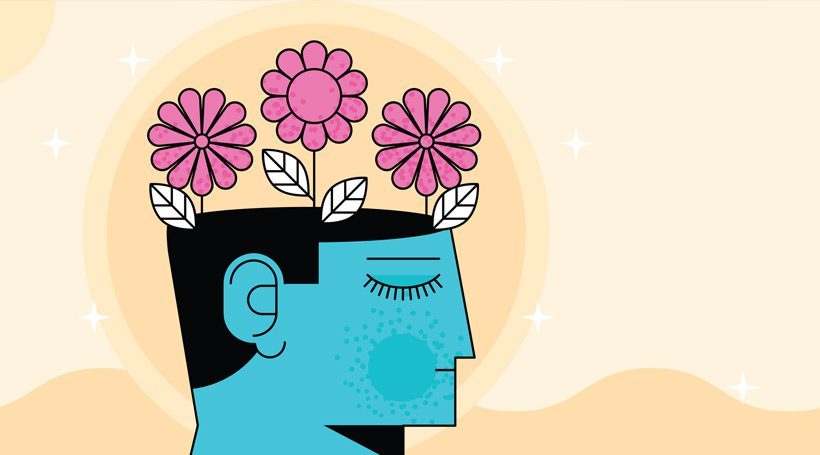If you think about it, we all have so much coming at us every day, it’s really no wonder that most people are struggling with their mental health. Just to different degrees.
We spoke with four mental health experts to find out what we can do, if anything, to make it through, to try to find peace and calm and maybe even hope. And for people who are really, really having a hard time, we asked how they can find help.

Participants:
Anne Greenwood, MA Assistant Vice President Oaks Integrated Care
Colleen Fitzpatrick, LCSW Instrumental Change
Stephen Mateka, DO Executive Medical Director of Psychiatry Inspira Health
Meg Clark Soriano, MA director Center for Counseling and Education
Everyone’s mental health today
Overall, everyone is on edge right now. We’re over inundated and over stimulated with fears and stressors. It makes it impossible to ignore the worry of what’s going to happen next. And is it going to happen to me or someone I care about.
Stephen Mateka
It’s not great. The number one reason people are calling us is anxiety. There is just a ton of anxiety and depression right now. Suicide rates are up.
Meg Clark Soriano
I think most people are on edge, and that’s due to many factors: political, economic, social. With the advent of social media and the way some people use it, they compare themselves to others and their feelings end up getting hurt.
Colleen Fitzpatrick
How to cope with politics & the state of the world
There are actually things you can do if you’re feeling overwhelmed with the current state of affairs. Recognize what is in your control and what is not in your control, and put your energy into the things in your control. If you’re sitting just scrolling and feeling overwhelmed, it’s like sitting in a rocking chair. You feel like you’re moving, but the reality is you’re in the exact same place. But you can reach out to your local congressperson or get involved in advocacy efforts. You always get to control how you choose to deal with information you’re receiving.
Stephen Mateka
I deal with this almost daily, and it’s hard. You have to find the balance between being informed and being overstimulated and distressed by what you’re reading, which is difficult. Sometimes we have to shut it down and take a break from the news. And separate from the media, have boundaries with your conversations. Know who will trigger you, set limits and take care of yourself.
Meg Clark Soriano
Know when to unplug. Know when more information, more exposure, is not helpful. Certainly if you or a loved one sees a shift in your mood, take a break from politics. I also like to engage in conversations with friends to just vent how I’m feeling. I also turn to comedy. Having a good laugh is a nice relief.
Anne Greenwood
Deciding if you need therapy
If the issues you’re struggling with keep you up at night, if they’re bothering your eating habits, if they’re bothering your ability to socialize and you’re just not enjoying your life overall, it’s time to consider therapy.
Colleen Fitzpatrick
Ask yourself: Is this a persistent problem? Is it distressing? Is it interfering with my life? Are you starting to use unhealthy coping skills, perhaps eating or drinking too much, sleeping too much? Are other people expressing concern and worry for you? Have you been thinking about therapy? Is that something that interests you?
Meg Clark Soriano
The most important thing is honest self-reflection to see if you’re showing up the way you want to in the important areas of your life, whether that’s at work, at home, with your partner or your children. When you start acting differently and are not achieving what you want, that’s a sign that things are starting to get significant.
Stephen Mateka
Ask yourself if you are having more than your normal amount of difficulty getting up and getting through the kinds of things that are expected of you. If you can’t function and pay attention on the job, if your emotional state is so overwhelming that it dominates your life, if you’re having troubling, maybe even dark, thoughts, that’s the time to start talking to somebody.
Anne Greenwood
The stigma of seeking help
The stigma is changing, and we should give credit where it’s due. A lot of celebrities are coming out, like Lady Gaga, and saying, “Yes, I struggled with PTSD” or “Yes, I struggled with anxiety or addiction issues.” Because then people say, “Wow, if they can get help, I can.”
Colleen Fitzpatrick
The stigma around therapy has changed, depending on the generation. When we’re looking at millennials and younger, these are people who have grown up with a mental health vocabulary and are not ashamed to identify with those struggles and seek help.
Stephen Mateka
What I find very inspiring is that there is more open conversation now, which means there is acknowledgement that people do struggle with mental health, and there are options for helping people so it isn’t something you have to whisper about.
Anne Greenwood
There still is a stigma, but I think it’s less. There have been a lot of organizations doing campaigns to raise awareness and public figures speaking out. Kids are really into learning about mental health. Maybe they see it on TikTok, but they’re consuming the information and talking amongst themselves in a much more casual way than we did when I was that age.
Meg Clark Soriano
What happens at therapy
By and large, you’re going to spend about 55 minutes to an hour – presuming we’re talking outpatient – with a therapist who is going to engage you in a conversation and address whatever you brought in as your concerns. There’s going to be some time assessing where you are at any point in time, talking about the things you’ve tried to address and making adjustments. Maybe there’s even a little bit of a homework assignment and some plans for follow up.
Anne Greenwood
Basically, the therapist tries to make a safe place for a person to share their story. A lot of people say, “I don’t know what to say,” and that’s perfectly normal. The therapist can ask guiding questions. It really depends on the person, but the basic idea is that the therapy session is supposed to meet the client where they are in that particular moment.
Meg Clark Soriano
It’s different for everybody. I focus on the therapeutic rapport for quite a while. I’m going to get to know you on an intimate level. I don’t want to just hear about your anxiety and depression. I want to hear about who you are as a person, your life, your relationships and how all those things are affecting your ability to live your best life.
Colleen Fitzpatrick
Once a safe space is created and the patient feels comfortable with their therapist, it’s important for the patient to identify what’s important to them. A therapist or a psychiatrist is not meant to make goals for the person. Our job is not to tell someone how to live their life. It is to identify the life that person wants to live and help guide them towards that.
Stephen Mateka
Telemedicine
Telemedicine in mental health has been shown to be effective. There’s still something that you’ll never be able to grasp through a screen – the energy in the room, maybe some of the small shifts in body language and facial expression – but overall, therapy absolutely can be conducted through telehealth.
Stephen Mateka
I think online therapy has offered access to people for whom therapy would have been a huge challenge, whether it’s a mobility challenge or an accessibility issue because of where they live geographically. It can also be a resource for people who would find face-to-face therapy too intense. So yes, there’s a place for online therapy.
Anne Greenwood
We do a lot of therapy online. Many people are back in person as well, but some people prefer online for the convenience. The research shows it’s just as effective.
Meg Clark Soriano
If you had asked me about telemedicine for therapy 20 years ago, I would have said, no way. But since the pandemic, we’ve had to adjust. And things changed. There’s a learning curve though. You can’t just jump in and do online therapy, it’s not the same dynamic as being in the office. Not at all.
Colleen Fitzpatrick
Childhood Trauma
Our brains develop when we’re children, so we are shaped by those experiences – our capacity for emotional regulation, our distress tolerance, our whole nervous system is wired a certain way based on our childhood experiences. Not that it can’t be changed, but it sets us up for perceiving the world in certain ways. Our beliefs about ourselves, about other people, about safety in the world are formed really young, and those beliefs guide us. They guide our decision making, and they can be triggers.
Meg Clark Soriano
Does everybody experience challenges during childhood? Yes. Do all challenges rise to the level of trauma? No. We all grow up in some kind of family where there’s a caregiver and you’re the child. That’s your blueprint for what human relationships look like. Your early experiences will impact you, depending upon what occurs in that context. Does it mean you can’t change some of the impact? No it doesn’t, but it will definitely impact you.
Anne Greenwood
Not everyone has childhood trauma. To suggest that would really minimize those who have suffered true abuse and neglect or were exposed to traumatic events with harm and death involved. But our childhood absolutely shapes who we become. As children, we are doing the best we can to be ok and get our needs met, so we are reliant on our parents, our caregivers, our community to guide us towards the effective ways to get those needs met. Our childhood absolutely impacts how we show up later on in life, because it shapes how we see the world, how we problem solve, how we see ourselves.
Stephen Mateka
If we are shown a lack of affection in childhood, then our love language, what makes us feel good, may become physical touch, which makes sense, because it’s something we didn’t get as a child.
Colleen Fitzpatrick
OCD (Obsessive Compulsive Disorder)
OCD is a type of anxiety diagnosis that can feature either one of two types of primary symptoms or a combination of both. It’s built there right in the diagnosis itself: obsessions, these are thoughts that come into our head that are really distressing and impact how we go about our daily life. Those thoughts can be coupled with what are called compulsions. These are acts that people do to help make the obsession go away, whether it seems rational or not, like counting numbers, checking things, washing hands.
Stephen Mateka
OCD is one of the most crippling things somebody can go through. Basically, the alarm system in your brain is broken. Someone may leave the house in the morning and think the coffee pot was left on. Did I turn it off? Let me go back and check. Did I turn it off? Let me go back and check. OCD is when those obsessions become compulsions, and it takes over your whole life and interferes with your ability to function.
Colleen Fitzpatrick
OCD is a disorder that has some symptoms that are particularly difficult for people to manage. They have intrusive thoughts that are nearly impossible to put out of their mind, and they typically are associated with behaviors that a person has to engage in to keep those thoughts at bay. In its most challenging form, it becomes very disruptive to conduct your life. You might find yourself so involved in compulsive behavior that you can’t get through a day.
Anne Greenwood
OCD can be very debilitating, but it’s also very treatable. One of the problems right now in our field is that often people are misdiagnosed and do not receive an accurate diagnosis of OCD. For many years, I have worked with people who have been to several therapists before me, and their OCD was missed. The training programs for therapists, the basic graduate level programs don’t spend much time on OCD at all, so there are a lot of therapists who do not understand OCD.
Meg Clark Soriano
Treating OCD
The standard of care to treat OCD is what’s called Exposure Response Prevention therapy. It is a type of cognitive behavioral therapy that slowly exposes a person to the thing they are fearful of, so that it eventually does not overwhelm and they eventually do not feel the need to do acts, either mentally or physically, that stops them from living their daily lives. There certainly are also medication options that have shown to be effective for OCD as well.
Stephen Mateka
The great thing about working with people with OCD is that once it’s identified and treatment begins, we often see incredible improvements. The gold standard is exposure and response prevention, which is a form of what most people call CBT, cognitive behavioral therapy. There are some other treatments, and medication can help. But even with medication, the recommendation is to also have therapy.
Meg Clark Soriano
One form of therapy we use for people with OCD is exposure therapy, where we slowly expose someone to what they’re obsessed with. Then they write down their feelings and over time, they start to realize it’s not a threat.
Colleen Fitzpatrick
Signs of Anxiety
You would be shocked at all the ways anxiety is manifested, both physically and emotionally. Physically, it is this horrible feeling in the pit of your stomach that something horrible is going to happen. Your chest may start pounding, you may sweat profusely. Some people tend to drop things a lot. Their motor skills are off. Anxiety can be absolutely crippling. You need to go to therapy for anything that starts to affect your daily living, your ability to function, your ability to eat, sleep, socialize. When those things are off, you need therapy.
Colleen Fitzpatrick
Anxiety is normal. Everybody has anxiety. It’s important to recognize when you have an anxiety disorder, and that has to do with the degree of the symptoms you’re having, the amount of time you feel anxious, how persistent it is, and most importantly, how much it impairs your life. Some people spend enormous amounts of time just trying to manage their symptoms, so they’re not very productive in achieving whatever goals they have for themselves.
Meg Clark Soriano
You might feel like your heart is racing, your breath rate is increasing, maybe your temperature is going up a little and you’re feeling a little sweaty, you might have a pit in your stomach – all of the things people associate with fear responses. Anxiety is when you have these reactions to something that is not actually happening.
Anne Greenwood
Everyone has anxiety. But not everyone has the type of anxiety that stops their ability to live their lives the way they want to live them. And that’s where, at times, it’s hard to tell the difference between the two. The main difference, and the main concern, is when your anxiety stops you from functioning and living your life.
Stephen Mateka
Symptoms of depression
Depression is so hard to describe. It’s like seeing life through black sunglasses. There’s so much negativity and hopelessness. The smallest thing can happen, and it becomes a big catastrophe, because when you’re depressed, you don’t have the coping skills to manage it.
Colleen Fitzpatrick
Major warning signs of depression are a mood shift, being irritable, having less interest in things you typically have interest in, fatigue and feeling like everything needs monumental effort. You could have an increase in appetite. You could have a decrease in appetite. When your symptoms become so pervasive that you are having a difficult time getting through your day or if you are starting to think it would be better off if you were dead, then clearly it’s time to reach out for help.
Anne Greenwood
Treating depression
We try to understand the root of the depression – what’s fueling these persistent feelings of sadness and loss of pleasure. There are a wide range of issues that can cause depression. Some people are genetically wired with a tendency towards depression, and that depression can be triggered by a situation or a traumatic life event. Often people who are depressed have anxious spirals of thoughts that can be untangled and clarified. A person can learn more healthy ways of thinking as well as healthier coping skills.
Meg Clark Soriano
We can treat depression through psychotherapy and with medication interventions. One of the most common ways to improve depression is called behavioral activation. If you think about it, if you tell yourself to feel happy and feel better, that doesn’t work. But pulling yourself to do pleasant activities and then sticking with it – even when it’s not feeling like it’s making an impact – can be a large proponent of the path to recovering from depression.
Stephen Mateka
How social media affects mental health
It’s not good if you’re living your life looking at your phone. But there’s a whole slew of people who are able to obtain connection for the first time on social media, like people in marginalized communities. And there are people who have done incredible advocacy work on social media, which wouldn’t have happened without that ease of connection. But if you have a tendency to compare yourself and your life with other people, you’re more liable to have distress.
Meg Clark Soriano
Social media was developed inherently as not a bad thing. But it’s the way we utilize it. I love Instagram, but I’m not comparing myself to other people, I’m looking at recipes. I’m not looking at who went to the most expensive restaurant, I couldn’t care less. If it’s monitored the right way, then it can be used as a tool. A lot of boundaries need to be set, whether you’re an adult or child.
Colleen Fitzpatrick
The algorithm becomes an echo chamber, so you only get exposed to information that reinforces what you already believe. Then you lose sight of open-mindedness without even realizing it. It also gives us over-stimulation of information, so our increased awareness of possible fears out in the world will naturally make us more fearful. The amount of times we see things on social media will trick us into believing things are happening that often, but we’re just seeing the same thing over and over. And then lastly, we know that on social media, you are only getting a snapshot of someone’s actual life, so when you take that post and compare yourself to it, that is pretty much a recipe for disaster.
Stephen Mateka
I am not a huge proponent of social media. I typically consume it for its informational value alone. You have to be a critical thinker when you’re consuming information published online. I was listening to a radio show that was talking about AI. If we thought social media was going to challenge us, we better strap ourselves in, because what’s potentially there with AI could take everything we’ve experienced and magnify it in ways we probably don’t completely understand.
Anne Greenwood
What work has taught them about life
I’ve learned people can heal. People are resilient. People can overcome incredible burdens and traumas.
Meg Clark Soriano
Early in my life, I decided I was going to conquer one of my biggest fears, which was death. I worked in hospice for several years, and the lessons I learned were amazing. I was meeting people who were dying and they regretted working too much, not keeping in touch with friends, not travelling enough. They taught me that if you want to take three vacations to Europe in a year, then you should do it.
Colleen Fitzpatrick
In the end, most things come down to having people who matter to you and being someone who matters to someone else.
Anne Greenwood
I can’t make anyone do anything. I could have the best understanding of someone, I can give them the best advice in the world, but if they are not ready to hear it and put it into action, it means nothing.
Stephen Mateka



















